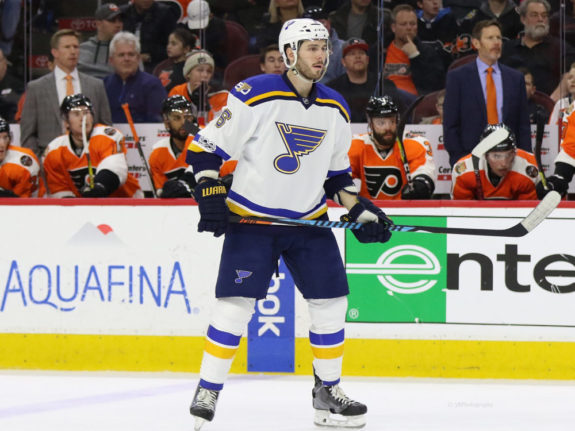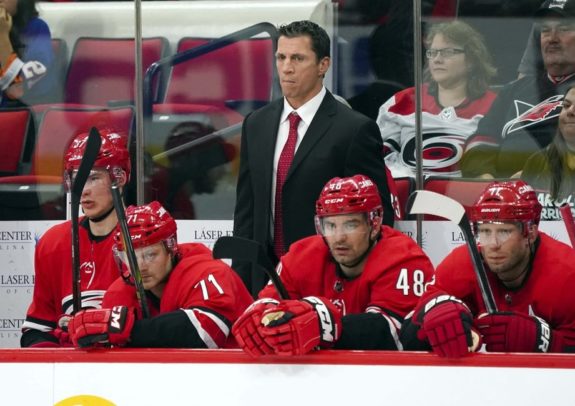When news broke Tuesday that Justin Faulk wasn’t on the ice for the Carolina Hurricanes’ morning scrimmage, questions immediately rose about his absence. When asked later that day, head coach Rod Brind’Amour said Faulk was healthy, but that he was told to keep him off the ice. Any hope we would see a week – or even a day – without Faulk trade rumors were quickly put to rest and the speculation circus began once again.
Several hours later, as many predicted, the longtime Hurricanes defenseman was traded. But the return itself was anything but predictable. In exchange for Faulk and a fifth-round pick, the Hurricanes acquired defenseman Joel Edmundson, forward prospect Dominik Bokk and a seventh-round pick from the St. Louis Blues.
The trade came as a surprise to many, as it had been previously reported that Carolina was on the hunt for a scoring forward, and players like the Anaheim Ducks’ Ondrej Kase and Winnipeg Jets’ Nikolaj Ehlers were among the top candidates. But the Hurricanes settled on another young European talent (Bokk), a roster defenseman (Edmundson) and freed up some cap space in the process.
Following the trade, Faulk signed a seven-year, $45.5-million contract with St. Louis with an average annual value (AAV) of $6.5 million. That’s a huge contract Carolina wasn’t able or willing to pay, but it also handcuffs the Blues, as they have players like Alex Pietrangelo, Brayden Schenn, and Vince Dunn up for new contracts next year.
The only summer news story drawn out longer than the Faulk saga was the Mitch Marner signing, but today, we can be thankful both of those are over. Now only eight days from opening night, it’s time to focus on the future for Carolina, both on the upcoming season and beyond.
Is the Return for Faulk Good Enough?
After the controversial Jeff Skinner trade last summer, general manager Don Waddell needed to strike gold this time and get good value back for Faulk. As opposed to the Skinner trade, it looks like he nailed it.
Bokk was a first-round pick (25th overall) of the Blues in 2018, and the main piece of the trade for Carolina. It was also the same draft in which the Hurricanes selected Andrei Svechnikov at No. 2. Bokk is a right-handed shooting winger who scored 8 goals and 15 assists in 47 games with Vaxjo HC of the SHL last season. The 6-foot-1, 180-pound German is labeled as an agile skater with a superb stickhandling ability. He uses his quick hands to navigate tight spaces and controls play with his strong edgework. Though his defensive game still needs improvement, he has a high skill ceiling – he even draws play-style comparisons to Ehlers.
Bokk is only 19 years old and hasn’t had a lick of NHL action yet, but he’s projected to become a top-six or top-nine winger. A former top prospect of the Blues, Bokk brings much-needed utility to Carolina’s forward group in the form of a right-handed shot, which the Hurricanes miraculously lack. Unfortunately, he’s still at least a year or two away from being ready to begin his NHL career.
The other piece of the deal is Edmundson, a four-year veteran of the Blues who plays a rough and tough defensive game. The 26-year-old stands at 6-foot-4, 215 pounds and brings yet another big presence to Carolina’s blue line, which already includes giants like Dougie Hamilton (6-foot-6, 229 pounds), Jaccob Slavin (6-foot-3, 207 pounds), and Brett Pesce (6-foot-3, 206 pounds). Hamilton and Jake Gardiner will be able to pick up the slack offensively, so the addition of Edmundson makes the Hurricanes much more difficult to play against.

Edmundson was second on the Blues in hits (128) and fourth in blocked shots (106), while logging an average shorthanded time-on-ice (TOI) of 2:04. Edmundson will likely be used on the third pairing in Carolina and will get regular penalty kill minutes along with Slavin and Pesce. Though he’s only signed for one year at $3.1 million, he allows Carolina extra salary cap breathing room now that Faulk’s $4.83 million is off the books.
Who Won the Trade?
It’s difficult to assess a trade when one of the main players involved has yet to play an NHL or AHL game. At first glance, the Blues look like a better team than before, immediately adding another top-four defenseman to an already daunting blue line. And though Bokk is still a few years away from making an impact with Carolina, the Hurricanes get a good addition in Edmundson, who can be effective with the team this season.
The Blues may look like winners today, but in a few years when we re-visit this trade, it could be a different story. Faulk is 27 years old, and his new contract won’t kick in until next year. By the time his new contract is up, he’ll be 35, and creeping into the tail end of his career. The AAV isn’t terrible at $6.5 million, but with Blues captain Pietrangelo’s contract expiring, it puts them in a sticky situation. Pietrangelo, 29, will be an unrestricted free agent at season’s end, and with Faulk’s new contract squishing St. Louis up against the cap ceiling, it may be difficult to make the moves needed to re-sign him. It’s an all-in year for the defending champions, as big decisions must soon be made.
Interestingly, while the Hurricanes whiffed on their shot to get a roster player to help them this season, it does leave the door open a crack if Williams chooses to return to hockey somewhere down the road. Not only that, but with Bokk, the future looks brighter than ever. The Hurricanes were the youngest team in the NHL last season and have now added yet another promising prospect to their squad. They also have two first-round picks in next year’s draft, which sets them up excellently for the future.
The bottom line is Faulk had to be traded this season before he walked – he and Carolina were never close enough on new contract negotiations. The Hurricanes didn’t have to offer anything more in the trade to move him and were able to keep the rest of their core together, which is another big win in this deal.

Under Brind’Amour’s system and guidance, the Hurricanes are still looking golden. They take a hit after losing veteran leaders like Faulk and Williams, but it won’t just cause their hard work ethic to disappear. Brind’Amour always holds his players accountable – it was the new guys themselves, like Dzingel and Gardiner, who expressed desire to play for Brind’Amour when they chose to sign with Carolina. The Hurricanes lost two of their valuable leaders, but Brind’Amour is the captain of the ship, and as this young team evolves, new leaders will emerge.
The biggest factor in assessing this trade will be based on how the Hurricanes can help Bokk bloom into his full potential. They’ve compiled a slew of great European talent through smart drafting and strong development. Carolina’s cup window is only just opening, and with all the talent in their locker room and farm system, it’s only a matter of time before they become one of the league’s major powerhouses.